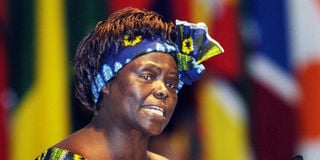Rename Karura forest in Wangari Maathai’s honour

The late Nobel Peace laureate Prof Wangari Maathai.
What you need to know:
- Ten years into her death, we are yet to properly honour Wangari Maathai posthumously in the way that a national heroine of her stature should be honoured.
- It would appear that we only remember Wangari Maathai when we are having conversations on conservation and environment.
September 25 marked 10 years since the death of Prof Wangari Maathai. She was not only the first woman to earn a PhD in East and Central Africa, she was also the first African woman to be awarded the Nobel Peace Prize and the only Kenyan Nobel laureate so far.
Her work, her sacrifice, her resilience and the fruits of her labour are well-documented. The impact of her tireless efforts to protect our environment and particularly Karura Forest and Uhuru Park has reverberated across generations who today enjoy the scenic nature trails that would have been gleaming office parks and malls had it not been for Wangari’s tenacity.
Ten years into her death, we are yet to properly honour Wangari Maathai posthumously in the way that a national heroine of her stature should be honoured. Sure, we have named a road after her, and an institute – the Wangari Maathai Institute for Peace and Environmental Studies at the University of Nairobi – but I think we need to do more for this woman who nearly gave up her life for the natural resources that we enjoy today.
It would appear that we only remember Wangari Maathai when we are having conversations on conservation and environment.
However, the Wangari Maathai conversation goes beyond environment. A woman of many firsts like Wangari is a national treasure and a powerful lesson to Kenya’s youth on the value of courage, resilience and sacrifice. Wangari would have opted for a quiet and cushy life in exile – like many activists we know – but she chose to stay home and fight for what she believed in. It didn’t matter if that involved beatings, public humiliation and jail. Wangari chose her country time and again, even when her country failed her many times.
Honouring heroes and heroines
We must, as a society, reflect on how we honour heroes and heroines like Wangari Maathai who, like many hardworking Kenyans, pulled herself up by her bootstraps, put in the work and placed national interests before self-interest.
Wangari, like most of us, was from a typical Kenyan family, raised in a normal family in the village and gradually worked her way up to international recognition. Her story resonates with every Kenyan’s story and this is why we must honour those who deserve it in a manner befitting a true hero.
Of course, Wangari is not new to having her efforts trivialised. In her memoirs, Unbowed, she writes that when she earned her PhD in 1971, the achievement was ‘conveniently ignored’.
“I was the first woman in East and Central Africa to receive a doctoral degree – a significant achievement that went largely unnoticed” she writes. “It didn’t even make the media headlines, probably because I was not the president, or his daughter, and my husband wasn’t famous. It is funny how such things can be conveniently ignored.”
We failed to sufficiently recognise Wangari when she was alive, we should not disappoint her even in death.
Let us begin by renaming Karura Forest to ‘Wangari Maathai Forest’.
The writer is the Director, Innovation Centre, at Aga Khan University; [email protected]





